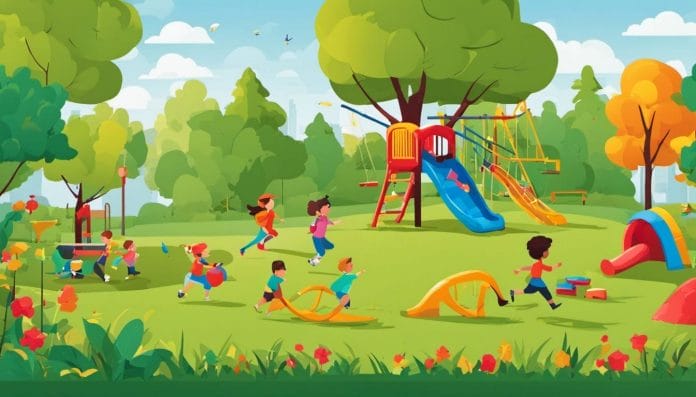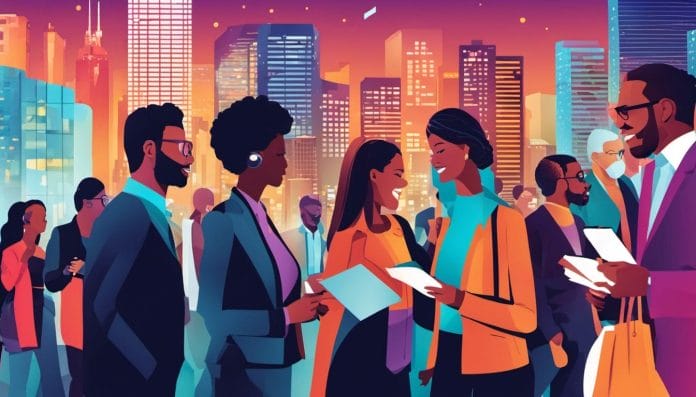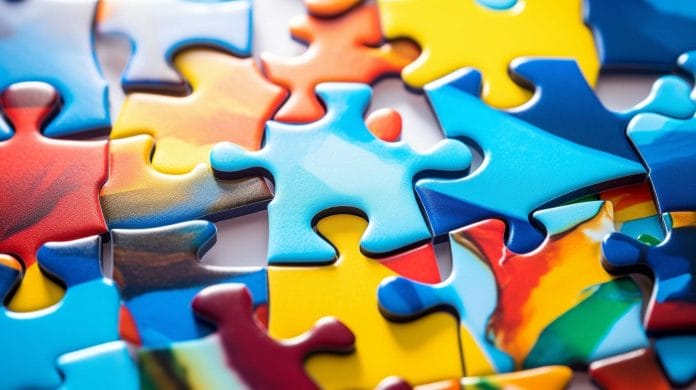Expertise in interpersonal communication.
Fundamental to effective communication, meaningful relationships, and both personal and professional development, social skills serve as the bedrock of our interpersonal interactions. This piece invites you to delve deeper into understanding and transforming these vital life tools.
Key Insights
- Social skills are paramount for achieving effective communication and establishing meaningful relationships across personal and professional dominions.
- Superior social skills encompass clear verbal communication, active listening, empathy, conflict resolution, cooperation, non-verbal communication, leadership, and even humor.
- Augmenting these skills can strengthen your social interactions, ameliorate relationships, and provide a significant upliftment to your career aspirations.
Demystifying Social Skills

Social skills encapsulate a practical toolkit of fundamental abilities employed when we interact and cooperate with others. From facilitating the creation of fresh bonds and the evolution of these into lasting friendships, good social skills operates as signals that we genuinely care about the emotions of our peers.
These skills can be exhibited in numerous ways. From the words we choose to articulate our ideas to our non-verbal cues like body language or the modulation of our voice, every action can speak volumes about our social dexterity.
Correct application of social skills often radiates a calming aura that puts others at ease, smoothing the path to participate in group discussions and recreational activities. Guided by your advanced social skills, you don’t have to agonize over your subsequent words or actions.
A mutual respect for the perspectives and needs of others is more likely to be met with a positive response. Hence, investing time to comprehend and enhance your social skills assumes utmost importance!
Why Social Skills Matter

Every aspect of life, including maintaining rewarding relationships, improved communication, and superior career prospects, are strongly influenced by Expertise in interpersonal communication.
Superior Communication with Social Skills
At the workplace, communication skills are a premium asset. Your thoughts and ideas need to be relayed to others in a clear and concise manner, ensuring that your peer understands your intent correctly. This clarity can empower colleagues to perform their tasks with precision and minimize the possibility of errors.
Being mindful and attentive to their viewpoint is an equally crucial segment of Expertise in interpersonal communication. When you resonate with other people’s ideas, showing them that their thoughts are valued, they’re more likely to bestow the same courtesy to you when it’s your turn to negotiate.
Eye contact, cited as one of the most powerful forms of non-verbal communication, is another aspect that deserves special mention. It convincingly conveys to your communicator that your attention is undivided and devoted to the on-going conversation.
Body language, too, is a crucial ingredient in the potion of effective communication. A mere action like a warm smile or a gentle nod can express agreement or understanding more eloquently than a repertoire of words.
Nurturing Healthy Relationships
Leveraging social skills not only facilitates forging new connections but also helps in strengthening these into robust friendships. Our actions, guided by our social skills, allow us to fit seamlessly into new groups, teach us to communicate, emote, and cooperate with people in a more engaging manner. For instance, when a friend shares their thoughts with you, employing active listening techniques can drive home the point that you genuinely care about what they’re saying.
Non-verbal cues involving body language, like eye contact or encouraging nods, can be a powerful means to convey this.
Sharing resources and experiences is another key aspect of fostering close connections with people. It emphasizes our regard for principles such as equality and fairness.
Patience is an enduring virtue, especially when disagreements surface, or contrasting views collide. Remaining patient allows us to hold our calm and provides the space to consider the situation from all angles before responding.
Teamwork and cooperation form the bedrock of strong relationships, whether at the workplace or within the family. Sharing ideas and visions in a clear and effective manner facilitates problem-solving as a collaborative entity.
Apart from these, numerous other social skills such as humor, empathy, and conflict resolution contribute towards fostering healthier relationships that can significantly influence not only our personal lives but also our professional path.
A Leg up in your Career
Social skills can lend a strong advantage in the professional world, where associations are built on trust, understanding, and cooperation. Colleague and superiors alike appreciate individuals who exhibit traits of effective listening and clear communication. The ability to resolve disputes amicably may prove game-changing in a corporate setting.
Displaying these skills can signal your readiness for taking on additional responsibilities or a higher role. This can lead to potential career growth with increased remuneration and respect in the workplace. Furthermore, honing social skills can simplify the job search process, helping you make a good impression during job interviews.
Breaking Down Social Skills

Critical aspects of social skills include verbal communication, cooperation, leadership, empathy, conflict resolution, active listening, non-verbal communication, and humor. Understanding and cultivating these components can significantly enrich your social interactions and improve your relationships with others.
Verbal Communication
Verbal communication is arguably the most vital part of robust Expertise in interpersonal communication. It involves not just the mere utterance of words but choosing them carefully to ensure accurate delivery of the intended message, with minimal scope for misinterpretation.
By developing effective verbal communication skills, you can foster better collaboration and forge strong bonds with your peers. This skill not only allows you to word your thoughts and ideas clearly but also ensures you actively listen to others.
Whether it’s a casual chat with friends or a boardroom discussion, good verbal communication forms the crux of building stronger connections and avoiding potential conflicts. The trick lies in voicing your opinion in a respectful and calm manner, no matter the intensity of the situation.
Cooperation
Cooperation is the bedrock of teamwork. It’s all about working hand-in-hand towards achieving common goals. Cooperation paves the way for harmony in group dynamics, regardless of the setting.
Individuals who are good at collaborating and sharing ideas often contribute positively to the success of a team project, leading to not just personal satisfaction but also the sense of accomplishment as a group.
Cooperation in a social context would require effective communication skills, active listening, empathy, and conflict resolution abilities. Pristine cooperation builds a path for solving complex issues with ease, bringing in the joy of collective success.
Leadership
Leadership qualities play a crucial part in nurturing Expertise in interpersonal communication. Acknowledging the potential impact of good leadership on interpersonal interactions is essential.
Good leaders guide their teams, mentor their subordinates, and foster a nurturing and supportive environment. They inspire skillsets like effective verbal communication, cooperation, empathy, conflict resolution, and active listening among team members.
In essence, their actions and leadership style set the tone for the team members, promoting the adoption of strong Expertise in interpersonal communication.
Empathy
One of the most appreciated social skills is empathy. The capacity to understand and share the feelings and experiences of others has a profound effect on how we connect with people. An empathetic individual makes people around them feel valued and understood, creating an instant bond.
As an unwritten rule of healthy social interactions, empathy enables smoother communication channels and fosters heartfelt understanding. The undercurrent of empathy running through your interactions helps build a sense of mutual trust and support, making them all the more meaningful.
Conflict Resolution
None of our interactions are devoid of conflicts. However, the ability to navigate through disagreements and reach a peaceful resolution is crucial in maintaining harmonious relationships. An individual with a knack for resolving conflicts effectively prevents misunderstandings and fosters a positive atmosphere for interactions.
Conflict resolution requires the ability to listen actively to the disputing parties, understand their viewpoints, and find a resolution that satisfies all. Empathy plays a critical role in this, helping to understand the emotions and concerns of the parties involved in the dispute.
Active Listening
Active listening involves being fully present and engaged in an ongoing conversation, giving your undivided attention to the speaker. Displaying understanding through verbal and non-verbal cues, such as nodding or maintaining eye contact, indicates your engagement in the conversation.
The practice of active listening entails establishing connections with others, building trust, and enhancing the overall quality of communication. The ability to listen actively also plays a significant role in resolving conflicts and can aid in avoiding misunderstandings.
Non-Verbal Communication
Non-verbal communication often speaks louder than words. It includes gestures, body language, and facial expressions that we unconsciously emit while engaged in a conversation. A firm handshake or a warm smile can bridge gaps faster than any verbal communication, forging instant connections.
Understanding these non-verbal cues can elevate your overall communication skills and foster a better connection with others. Thus, paying attention to both words and non-verbal cues is crucial for effective communication.
Humor
A dash of humor in social interactions can diffuse tense situations and quickly establish rapport with others. Used appropriately, humor creates a positive and enjoyable atmosphere during conversations and other social interactions.
Having a sense of humor makes people feel more relaxed and the conversation more enjoyable. Being able to express and appreciate humor makes it easier to form and strengthen social bonds.
Social Skills In Action

Social skills are quite like a dance that requires practice and patience to perfect. Examples of social skills in action include providing constructive criticism, practicing patience, displaying good manners, compromising, and receiving feedback graciously.
All these behaviors reflect the person’s ability to communicate effectively, show empathy, and maintain positive relationships with others. And these skills are not static but can be honed and refined throughout life to provide better, more fulfilling interactions with others.
However, just like there are good practices, there are also some behaviors that hinder effective communication and create tension during social interactions. These include a lack of empathy, poor listening skills, the inability to offer or accept criticism, and impatience.
Recognizing and addressing these problematic behaviors is crucial in refining our social skills and improving our relations with others. Let’s delve deeper into some of these practices.
Downside of Poor Social Skills
Having a set of poorly developed social skills can create friction in social interactions, impairing the quality of personal and professional relationships.
- Lack of Empathy: Without empathy, it becomes harder to show compassion, offer support, or even just listen actively. Those lacking empathy may often come across as insensitive or uncaring, inhibiting understanding and rapport-building in personal and professional situations.
- Inadequate Listening Skills: Individuals with poor listening skills often fail to engage in conversations fully, leading to misunderstandings and feelings of being unheard.
- Inability to Give or Accept Criticism: The inability to offer or accept criticism prevents personal growth and strains relationships as constructive feedback is crucial for self-improvement and mutual understanding.
- Impatience: Displaying impatience in a social setting can suggest the lack of value for others’ time, leading to strained interactions and a lack of understanding between parties.
To uplift one’s social skills, addressing these problematic behaviors is vital. This can be achieved by actively practicing empathy, honing active listening skills, being open-minded towards feedback, and nurturing patience during interactions with others.
How Can Improving Social Skills Help in Developing Effective Leadership Skills?
Improving social skills plays a crucial role in developing effective leadership skills. Leaders with strong social skills can establish rapport, communicate effectively, and build strong relationships with team members. By conducting a swot analysis for effective leadership, leaders can identify their strengths, weaknesses, opportunities, and threats, enabling them to adapt their leadership approach and enhance their overall effectiveness.
Impact of Social Skills in Various Life Stages

From childhood through adulthood and professional life, social skills play a vital role in every stage of our lives. They are a crucial part of building strong relationships, achieving career goals, and smoothly navigating the numerous social situations we encounter daily. Hence, honing these skills can assist in thriving across different settings and leading fulfilling lives.
Social Skills for Children
Right from the formative years, social skills play a pivotal role in overall childhood development. These skills help children interact with others, form and sustain friendships, and navigate social situations effectively.
By introducing children to social skills early on, they can develop empathy, cooperation, conflict resolution abilities, and a respect for the personal space of others.
However, some children might encounter challenges while developing these skills due to neurodevelopmental disorders like Autism Spectrum Disorder or problems associated with Attention Deficit Hyperactivity Disorder (ADHD). In such cases, teaching specific strategies catered to their needs becomes essential.
Social Skills for Students
Crucial for navigating school life, social skills assist students in communicating effectively with their peers and teachers, working on group projects, resolving conflicts smoothly, and accepting feedback in a positive manner. Students with honed social skills often excel acadically and enjoy better relationships with their peers, demonstrating the ability to express themselves clearly and listen actively.
Social Skills for Adults
On both personal and professional fronts, social skills are vital for ensuring successful social interactions for adults. As professionals, it’s integral to develop strong social skills to establish rewarding relationships, engage in effective collaboration, and showcase effective leadership skills.
Importance of Social Skills in the Workplace
In the professional sphere, the significance of social skills is paramount. Social skills that foster improved collaboration and teamwork, leading to better relationships among colleagues, prove highly beneficial. By promoting a positive work environment, these skills can contribute to personal success and the overall productivity of the organization.
Conclusion
At the end of the day, mastering social skills is vital for enjoying better social interactions. Improving communication, enhancing relationships, and providing a much-needed impetus to career prospects can noticeably impact our lives.
By observing examples of both good and poor social skills as guidelines, we can understand the requisite behaviors to thrive socially. With a little dedication and regular practice, we can refine our social skills that lead to more fulfilling, rewarding, and lasting connections with others.
So, embrace the power of social skills today: adventure into the exciting world of better and more meaningful social interactions.
Frequently Asked Questions
We often encounter questions about the definition and role of social skills in various areas of life. Here’s a selection of frequently asked questions (FAQs) to provide some quick and easy answers.
1. What are examples of social skills?
Social skills include the ability to communicate verbally, reflect active listening, maintain eye contact during conversations, resolve conflicts efficiently, and understand body language, among others.
2. How can improving social skills benefit our life?
Improving social skills can greatly impact various aspects of both personal and professional lives. From enhancing your communication and minimizing stress to fostering a more affirmative perception of yourself and others, the benefits are multifarious.
3. Can these same social skills be used for children too?
Absolutely. Teaching children social skills like maintaining eye contact, sharing resources, and clearly expressing their thoughts and feelings plays an essential role in their mental growth and facilitates their ability to forge friendships.
4. Are there different types of good social skills?
Indeed. The realm of social skills is extensive, ranging from non-verbal communication like recording and interpreting facial expressions, to academic interpersonal abilities such as creating a personal space bubble or finding common ground during conversations.
5. Do better social skills boost one’s job search performance?
Unquestionably! Oftentimes, during job searches, hiring managers highly value candidates who can display effective soft communication skills. These qualities, along with the required hard skills mentioned in the job description, can give you a substantial advantage in the hiring process.
6. Can an individual have poor social skills despite frequent interaction via digital means like online chats or using apps?
It’s possible. While active interaction through apps or chat platforms does indicate social involvement, true social skill development involves learning how to handle real-life scenarios – something often not fully conveyed through text alone.
Remember, recognizing and developing bolstered social skills is an ongoing process. With consistent practice and openness to learn, we can all improve our ability to handle social interactions and relationships effectively. Moreover, by identifying and addressing areas of improvement, we can continue to grow and enhance our social skills throughout our lives. Always remember, social skills bridge the divide between us, making personal connections a boon to cherish.

